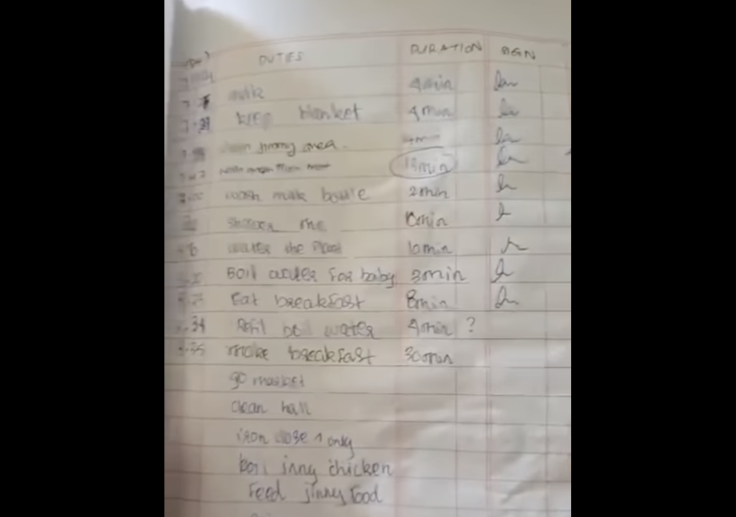Shocking Video Of Singaporean Influencer Berating Domestic Worker Over Slow Work Goes Viral
The Regent Maid Agency shared the video which was sent by the employer

A video uploaded by a Singaporean domestic worker agency has sparked outrage online after an influencer was seen berating her domestic worker over a language barrier and slow work performance. The incident occurred on September 16th, when the Regent Maid Agency shared a video initially sent by the employer, Ms L, who had logged the worker's chore completion times and verbally abused the worker for her perceived inefficiency.
The Incident: Berating Over a Logbook
The video, which quickly went viral, shows Ms. L documenting and critiquing her Myanmar domestic worker's speed in completing household chores. As the footage progresses, Ms. L's frustrations visibly escalate. She angrily accuses the worker of being too slow. She frequently raises her voice, eventually shouting and slamming her hand on the table in front of the worker, who remains silent throughout the confrontation, visibly flinching.
Ms. L criticised her employee's inability to meet her standards, particularly in terms of English language proficiency and efficiency, just four days into the domestic worker's employment. In the video, the influencer implemented a logbook system where the worker was expected to record her completed tasks and their respective durations. Ms. L found this system unsatisfactory, and the situation deteriorated further.
Signs of Abuse Highlighted by ACT Against Violence
This incident has raised concerns over the mistreatment of domestic workers, with Ms L's behaviour exhibiting two key signs of abuse, as outlined by Singapore's ACT Against Violence campaign.
- Overwork: It was reported that Ms. L forced the worker to fold clothes late into the night until they met her standards, violating regulations that guarantee workers at least eight hours of rest. The agency had to remind Ms. L of this requirement after the worker was deprived of adequate rest.
- Verbal Abuse: In the video, Ms. L's hostile tone, punctuated by derogatory remarks like, "What do you think you are?" and "My time is very what?" exemplifies the verbal abuse that has concerned many viewers. The Centre for Domestic Employees (CDE) has since contacted the Regent Maid Agency to address the incident.
Public Reaction: Outrage and Condemnation

The video's release prompted a tidal wave of backlash across social media platforms, with netizens taking to Facebook and TikTok to express their dismay. Comments criticised Ms. L for her aggressive tone and apparent lack of respect for the worker's dignity.
One comment stated: "She disregarded the helper as a person [...] Clear communication and respect are key to a healthy working relationship." Another added: "She already loses half her points by slamming and shouting. A logbook doesn't show she was teaching anything." The public response overwhelmingly sided with the domestic worker, condemning Ms. L's conduct as abusive and disrespectful.
Influencer's Identity and Repercussions
While the agency chose not to disclose Ms. L's name to protect her privacy, it confirmed that she is a social media influencer. Despite her attempts to use the video to portray herself as justified in her actions, the post has backfired, with users calling for her to face social and legal consequences. Netizens have also flooded the comment section of MothershipSG's TikTok account with the name of the alleged employer.
One commenter said: "Oh my God, what is wrong with her? She needs to be punished socially!" Another voiced concern for the worker's well-being: "The maid is someone's precious daughter. Please bear that in mind." Many expressed disbelief over Ms. L's behaviour, with some calling for stricter enforcement of protections for domestic workers.
Addressing Abuse in the Domestic Workforce
The treatment of foreign domestic workers in Singapore remains a critical issue, with the Ministry of Manpower and organisations like the Centre for Domestic Employees and ACT Against Violence working to safeguard workers' rights. Domestic workers, many from countries like Myanmar, the Philippines, and Indonesia, are often vulnerable to mistreatment due to language barriers, isolation, and financial dependency on their employers.
According to ACT Against Violence, overwork, verbal abuse, and isolation are common forms of abuse experienced by domestic workers in Singapore. The Centre for Domestic Employees has confirmed it is working closely with the agency to ensure the worker's rights are upheld and that such incidents are addressed swiftly.
© Copyright IBTimes 2025. All rights reserved.






















